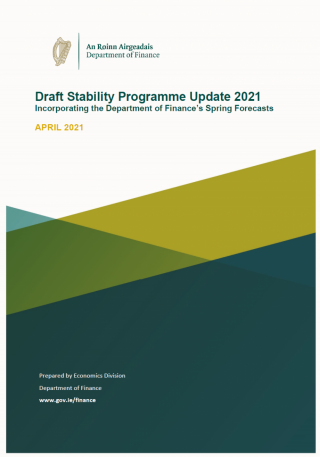Stability Programme Update raises major challenges concerning debt, infrastructure taxation, and services

The Government’s Stability Programme Update raises major challenges for Ireland on debt, infrastructure, taxation and services. A misplaced focus on the deficit and any return to austerity to accelerate debt-reduction and fiscal balancing would not only be counter-productive, but would be damaging to society. As Ireland emerges from the worst impacts of the pandemic we must not allow the ‘reducing the deficit’ narrative to dominate economic discourse. Ireland may be comparatively well off in some areas; however there are substantial inequalities that must be addressed.
Social Justice Ireland's initial response to the Department of Finance’s publication:
Debt
- Debt reduction must not become the focus of economic recovery as we emerge from the pandemic.
- Government should ringfence the COVID-19 related debt and ensure that this is dealt with appropriately at an EU level. This should form a key component of Government’s input to discussions regarding the appropriateness of the Stability and Growth Pact post-2022.
- Borrowing cheaply for investment always makes good fiscal sense, but it makes more sense than ever, now.
- Social Justice Ireland’s message is simple: Lock in this cheap money for as long a timeframe as possible; do what already needed to be done on poverty and social exclusion, housing and health, Just Transition, and other infrastructure investment; and park the costs as cheap borrowing to be run down over several decades.
Taxation
- Social Justice Ireland renews our call on Government to move to a more just taxation system.
- This requires reforming the current system, broadening our tax base, implementing a Minimum Effective Corporate Tax Rate of 6 per cent and committing to increasing our total tax take by €2.5bn to €3bn per annum.
- Government needs to implement these changes in advance of the OECD BEPS process and get ahead of the inevitable changes to the global tax landscape as a result of changes internationally.
- The issue of corporate tax contributions is principally one of fairness. Profitable firms with substantial income should make a contribution to society rather than pursue various schemes and methods to avoid such contributions.
- A just tax system is essential if Ireland is to address the reality that investment is essential for a number of reasons: a) to secure economic development; b) to protect communities (with initiatives such as Community Healthcare Networks); c) to keep unemployment as low as possible (with initiatives such as a substantial state-led childcare programme); d) to ensure critical infrastructure deficits are addressed; and e) to tackle climate change at the level required, and ensure that the transition to a low-carbon economy is just and fair.
Infrastructure
- Investment in housing must be prioritised given the impact is has on all areas of the economy and society. Ireland has a totally inadequate supply of social housing. The level of expenditure on social housing needs to rise dramatically if the needs of the most vulnerable are to be met.
- Investment in broadband and related infrastructure is essential to support regional and rural development. Improved and expanded public services (including public transport, broadband, healthcare, childcare) are vital to ensure that rural and regional areas are not left behind but, rather, are supported to deal with the challenges of the impact of technology on employment and the transition to a carbon-neutral society.
Services
- Government must take initiatives to deal with the unemployment challenge post pandemic. Social Justice Ireland estimates that the post-COVID unemployment rate could be as high as 10 to 12 per cent of the labour force. Investment in reskilling, training and supporting young people should be key policy priorities.
- The discrimination now built into our two-tier social welfare system must be urgently addressed, particularly in light of unemployment projections. Core social welfare rates should be benchmarked at 27.5 per cent of average earnings (which is €222.08 per week) over one or two budgetary cycles.
- The phenomenon of widespread unemployment looks set to return once the temporary Covid-19 employment supports are phased out. Maintaining adequate levels of social welfare is vital to ensure that we do not see an increase in poverty and deprivation. If those dependent on social welfare are not to fall behind the rest of society at times of economic growth, the benchmarking of welfare rates to 27.5 per cent of average wage rates is essential.